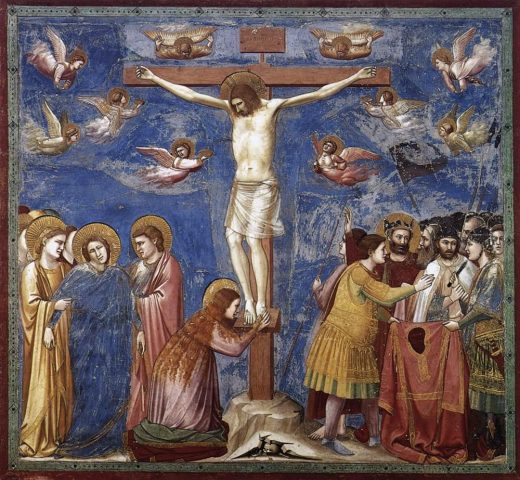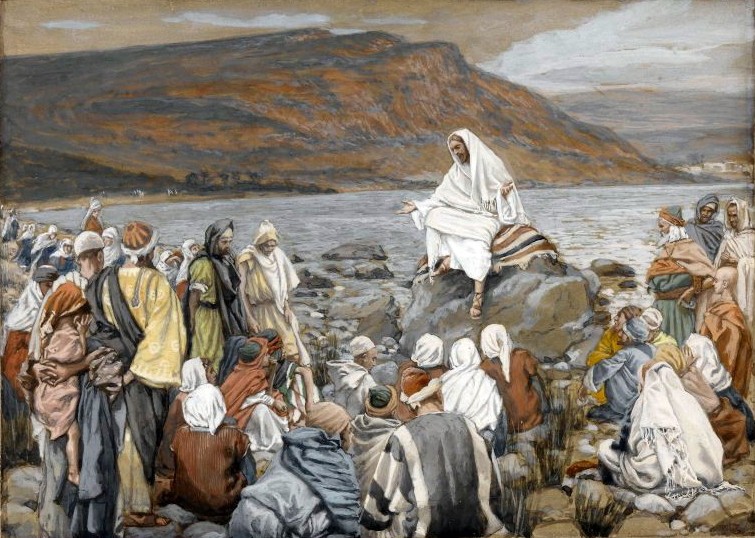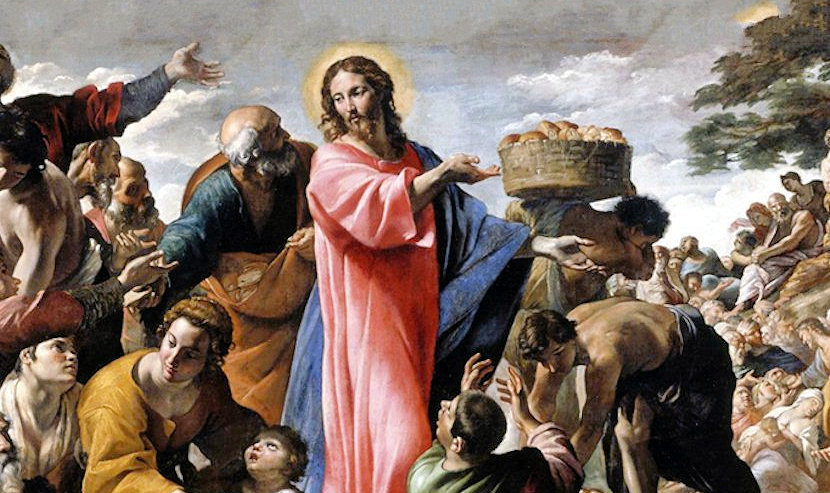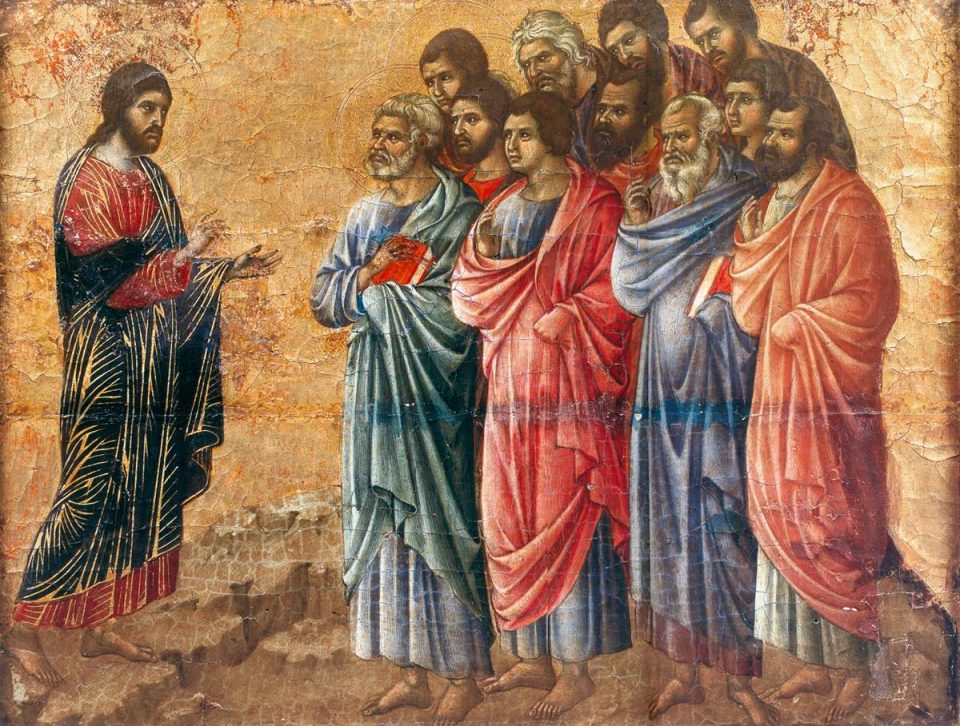“So must the Son of Man be lifted up”
Author Don Schwager
Gospel reading: John 3:13-17 (alternate reading: Luke 6:27-38)
13 (Jesus answered) “No one has ascended into heaven but he who descended from heaven, the Son of man. 14 And as Moses lifted up the serpent in the wilderness, so must the Son of man be lifted up, 15 that whoever believes in him may have eternal life.” 16 For God so loved the world that he gave his only Son, that whoever believes in him should not perish but have eternal life. 17 For God sent the Son into the world, not to condemn the world, but that the world might be saved through him.
Old Testament reading: Numbers 21:4-9
4 From Mount Hor they set out by the way to the Red Sea, to go around the land of Edom; and the people became impatient on the way. 5 And the people spoke against God and against Moses, “Why have you brought us up out of Egypt to die in the wilderness? For there is no food and no water, and we loathe this worthless food.” 6 Then the Lord sent fiery serpents among the people, and they bit the people, so that many sons of Israel died. 7 And the people came to Moses, and said, “We have sinned, for we have spoken against the Lordand against you; pray to the Lord, that he take away the serpents from us.” So Moses prayed for the people. 8 And the Lord said to Moses, “Make a fiery serpent, and set it up as a sign; and every one who is bitten, when he sees it, shall live.” 9 So Moses made a bronze serpent, and set it up as a sign; and if a serpent bit any man, he would look at the bronze serpent and live.
Meditation: Do you know the healing transforming power of the cross of Jesus Christ? The Lord Jesus came to unite earth with heaven and to raise those on earth to the glory of heaven. Jesus explains to Nicodemus, one of the chief leaders of the Jewish nation, that he is the “Son of Man” sent by the Father in heaven to restore our broken relationship with God. The “Son of Man” is a key Old Testament title for the Messiah who comes from heaven to establish God’s kingdom on the earth (see the prophecy of Daniel 7:13-14).
Moses delivers his people from death in the wilderness
What does Jesus mean when he says the “Son of Man must be lifted up?” Jesus links this expression with Moses who “lifted up” the bronze serpent in the wilderness in order to bring about healing and restoration of life to those who were bitten by deadly serpents. This plague of death was the result of the peoples’ stubborn refusal to follow God’s counsel and direction for their welfare. God in his mercy heard the prayer of Moses to free his people from this curse. God instructed Moses to “make a fiery serpent, and set it on a pole; and every one who is bitten, when he sees it, shall live” (Numbers 21:8). Moses lifted high the image of a bronze serpent fixed to the wood of the pole, which resembled a cross. Those who put their faith in God by repenting of their disobedience were healed and restored to wholeness of life.
Jesus links his victory on the cross with Moses’ act of deliverance
Jesus clearly links Moses’ act of deliverance in the wilderness with his own impending sacrificial death when he will be “lifted up” on the wood of the cross at Calvary. Unlike Moses’ deliverance in the wilderness which only resulted in temporary relief for the people, Jesus’ atoning death on the cross brought decisive victory over sin, Satan, and death. Jesus’ victory on the cross cancels the debt of our sin, and releases us from guilt and condemnation. His death and victory brings us new life – the new abundant life in his Holy Spirit which lasts forever.
Jesus’ victory on the cross also brought about his glorious bodily resurrection to new unending life and his ascension to the right hand of the Father in heaven, where he now rules and intercedes for us. The result of Jesus “being lifted up on the cross,” and his rising and ascending to the Father’s right hand in heaven, is our “new birth in the Spirit” and adoption as sons and daughters of God. God not only has redeemed us from sin in Christ, he also fills us with his own divine life through the gift of his Spirit that we might share in his own glory.
The proof of God’s love for us
There is no greater proof of God’s love for us then the sending of his Son to become one with us in our humanity and to lay down his life for us. “To ransom a slave God gave his Son” (an ancient prayer from the Easter vigil liturgy). God sent his Son to free us from the worst of tyrannies – slavery to sin and the curse of death. Jesus’ sacrificial death was an act of total love through self-giving. Jesus gave himself completely out of love for his Father. And he willing laid down his life out of selfless love for our sake and for our salvation. His death on the cross was both a total offering to God and the perfect sacrifice of atonement for our sin and the sin of the world.
John tells us that God’s love cannot be limited because it is boundless and encompasses all of creation (John 3:16). His love is not limited to a single nation or a few chosen friends. His love is limitless because it embraces the whole world and every individual created in “his image and likeness”. God is a persistent loving Father who cannot rest until all of his wandering children have returned home to him. Saint Augustine says, God loves each one of us as if there were only one of us to love.
The love of God is rooted in truth, goodness, and mercy
God gives us the freedom to choose whom and what we will love and not love. We can love the darkness of sin and unbelief or we can love the light of God’s truth, goodness, and mercy. If our love is guided by truth, goodness, and that which is truly beautiful, then we will choose for God and love him above all else. What we love shows what we prefer. Do you love God who is the supreme good above all else? And do you seek to put him first in all your thoughts, cares, choices, and actions?
God’s love sets us free to love and serve others
God’s love has been poured into our hearts through the gift of the Holy Spirit (Romans 5:5). Do you allow God’s love to purify your heart and the way your treat others? Do you allow God’s love to transform your mind and the way you think of others? Do you allow God’s love to conquer every unruly passion and addiction that would enslave you to sin and harmful behavior? The Holy Spirit gives us his seven-fold gifts of wisdom and understanding, right judgment and courage, knowledge and reverence for God and his ways, and a holy fear in God’s presence (see Isaiah 11) that we may live God’s way of life and serve in the power and strength of his enduring love and mercy. Do you thirst for new life in the Spirit?
“Lord Jesus Christ, your death brought life for us. Fill me with your Holy Spirit that I may walk in freedom and joy as a child of God and as an heir with Christ of an eternal inheritance.”
Psalms 78:1-2,34-38
1 Give ear, O my people, to my teaching; incline your ears to the words of my mouth!
2 I will open my mouth in a parable; I will utter dark sayings from of old,
34 When he slew them, they sought for him; they repented and sought God earnestly.
35 They remembered that God was their rock, the Most High God their redeemer.
36 But they flattered him with their mouths; they lied to him with their tongues.
37 Their heart was not steadfast toward him; they were not true to his covenant.
38 Yet he, being compassionate, forgave their iniquity, and did not destroy them; he restrained his anger often, and did not stir up all his wrath.
Daily Quote from the early church fathers: Story of Moses and the bronze serpent, by Cyril of Alexandria (376-444 AD)
“This story is a type of the whole mystery of the incarnation. For the serpent signifies bitter and deadly sin, which was devouring the whole race on the earth… biting the Soul of man and infusing it with the venom of wickedness. And there is no way that we could have escaped being conquered by it, except by the relief that comes only from heaven. The Word of God then was made in the likeness of sinful flesh, ‘that he might condemn sin in the flesh’ (Romans 8:3), as it is written. In this way, he becomes the Giver of unending salvation to those who comprehend the divine doctrines and gaze on him with steadfast faith. But the serpent, being fixed upon a lofty base, signifies that Christ was clearly manifested by his passion on the cross, so that none could fail to see him.” (excerpt from COMMENTARY ON THE GOSPEL OF JOHN 2.1)
Meditations may be freely reprinted for non-commercial use, please cite credits: copyright (c) 2017 Servants of the Word, source: www.dailyscripture.net, Author Don Schwager
Scripture quotations from Common Bible: Revised Standard Version of the Bible, copyright 1973, and Ignatius Edition of the Revised Standard Version of the Bible, copyright 2006, by the Division of Christian Education of the National Council of the Churches of Christ in the United States of America. Used by permission. All rights reserved. Citation references for quotes from the writings of the early church fathers can be found here.







